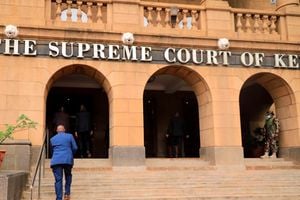
The legal profession cannot project a value proposition that makes it the preferred steward of citizen interests.
There is a direct and revealing connection between the ignominious saga of a flamboyant charlatan who brazenly passed himself off with breath-taking aplomb and to great effect as an advocate, and a letter by the Law Society of Kenya, the easily overwhelmed and scandalously fraud-prone gatekeeper of the professional interests of Kenyan advocates, threatening to sabotage the smooth operations of the Judiciary unless it rescinds the decision to establish Judiciary Desks at Huduma Centres throughout the country.
Of immediate concern is the primary implication of this protest; that inclusive access to justice is deleterious to legal practice, and, by extension, that appearances before the courts of law is, or ought to be the irrevocable monopoly of advocates. Such an inimical posture hardly squares with the advocate's solemn oath to uphold the rule of law and administration of justice, insofar as it elevates the advocate's professional subsistence above a citizen's fundamental constitutional right.
Although the LSK cited the possibility of quacks infiltrating and abusing the digitised court registry service, the message that came out strongly during the LSK election campaigns was that universal access to court services was a threat to “bread and butter” at a time when, absurdly enough, “protecting advocates' areas of exclusive practice” had become the defining agenda of the professional leadership. In any event, quacks have infiltrated and abused the practice of law with humiliating ease in the rigidly analog days, and the numbers of lawyers and judicial officers was still low.
Quite obviously, digitisation is neither necessary nor sufficient for quackery to thrive, and the LSK's threat to subvert the administration of justice, contrary to its raison d'etre, must be seen for what it really is, a vulgar attempt to entrench, in effective policy, the base physiological imperatives of a profession that has resisted necessary evolution to remain competitive in the face of rapid social, economic and technological transformation.
Without the paralysing measures imposed in response to the Covid-19, law would still be the world's most archaic profession. The pandemic dragged lawyers, kicking and screaming, into the world of virtual hearings and digitised filings, and occasionally headlong into the treacherous domain of automated research and other abuses of artificial intelligence.
Post-pandemic, law can hardy resist the intoxicating comforts of regression into obsolescence, and needs a compelling reason to keep up with the heady pace of technological advances. The ongoing digitisation of the Judiciary, a highly welcome logical next step in the direction of pandemic-induced adaptation, is evidently undesirable to advocates, to the extent that it empowers citizens to undertake self-representation more efficiently than before.
It now emerges that the legal profession cannot project a value proposition that makes it the preferred steward of citizen interests. Rather, it is powerlessness of the citizen in the face of the implacable judicial apparatus that is the real basis of the advocate's monopoly. Empowerment of the citizen through universal access to judicial services, is therefore an existential threat to advocacy as presently constituted in Kenya.
The argument about potential abuses and quacks is a ridiculous fig leaf for a number of reasons. As already stated, charlatans have never faced serious restraints in their fraudulent pretences and dangerous masquerades both in private chambers and before courts. The current sensation about a certain notorious impostor has brought home the extent of the decline in the professional standards of our legal community: neither learned magistrates, nor counsel could tell a dapper conman without a day of law school apart from a duly qualified advocate. This absence of distinction affirms that a bad advocate is as disastrous to the public interest as an outright quack.
This means that instead of implementing vigilante crackdowns in search of impostors, the LSK should urgently concern itself with the mandate defining a powerful value proposition for advocates by enforcing high professional standards, and taking effective measures to position itself as a movement of innovative, responsive and progressive legal intellectuals with capacity to efficiently operate the vital levers of democratic governance and economic dynamism in the eye of tempestuous global change.
Reference to standards in connection with the legal profession is bound to be problematic. No acceptable reason has been submitted for the systematic end-to-end subversion of the legal profession: loosening of entry requirements to undertake legal studies, dilution and lackadaisical administration of the legal education curriculum, sabotage of the sole backstopping mechanism at the Council for Legal Education, non-existent apprenticeship by way of a thorough pupilage, and permission for advocates to operate chambers unsupervised months after enrolment.
Given the extent of deliberate ruin in the legal sector, more and more qualified advocates are at least as bad, if not actually more ignorant and miserable than impostors. Under these conditions, the citizen benefits from the choice to engage directly and in person with the judicial system. In any event, advocates should be offering integrity, efficiency and demonstrable learning, not claiming an illegitimate monopoly of access to justice.
- Mr Ngéno is an Advocate of the High Court










